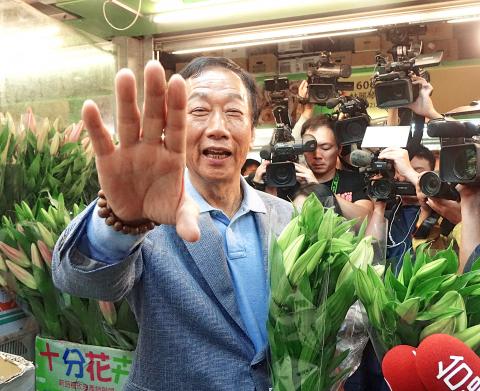Hon Hai Precision Industry Co chairman Terry Gou (郭台銘) yesterday said that if elected president, he would seek to expand Taiwan’s international space by advocating the so-called “1992 consensus” based on “one China, with each side having its own interpretation of what that means.”
“My stance has always been that, without the ‘each side having its own interpretation of what China means,’ there would be no 1992 consensus,” he told reporters at Taipei Flower Market, before shopping for Mother’s Day flowers for his mother and wife.
The “1992 consensus,” a term former Mainland Affairs Council chairman Su Chi (蘇起) in 2006 admitted making up in 2000, refers to a tacit understanding between the Chinese Nationalist Party (KMT) and the Chinese government that both sides of the Strait acknowledge there is “one China,” with each side having its own interpretation of what “China” means.

Photo: Chang Chia-ming, Taipei Times
“I would only accept the 1992 consensus on the condition that each side has its own interpretation of what China means,” he said.
While many have criticized him for saying that Taiwan is a part of China, what he meant by “China” was the “two Chinas” implied in “each side having its own interpretation” — namely “the Republic of China and the People’s Republic of China,” he said.
The reason Beijing has blocked Taiwan’s participation at the World Health Assembly (WHA) is because the government does not accept the “1992 consensus,” he said.
If elected, he would seek to improve Taiwan’s participation at international organizations by advocating a “1992 consensus” inclusive of “one China, each side having its own interpretation of what that means,” he said.
He urged Beijing to allow Taiwan to take part at the WHA at least as an observer, as it did when Ma Ying-jeou (馬英九) was president.
Asked about his view on international trade, he said that Taiwan needs to establish free-trade zones to promote its highly competitive machine tools, semiconductors and software.
“It would create opportunities, not a crisis,” he said, adding that a focus on defenses would lead to inaction.
He also hopes to help the nation sign a free-trade agreement with the US, he said, adding: “I am the most capable of achieving that, as I have the most experience at doing it.”
Asked about a planned meeting with Chinese Nationalist Party (KMT) Chairman Wu Den-yih (吳敦義) on Monday next week, Gou said he would share his view on “what would make a fair and transparent primary.”
He would insist that the party hold a debate at which the KMT’s presidential hopefuls could share their platforms on cross-strait relations, socioeconomic issues and other areas, he said.

Alain Robert, known as the "French Spider-Man," praised Alex Honnold as exceptionally well-prepared after the US climber completed a free solo ascent of Taipei 101 yesterday. Robert said Honnold's ascent of the 508m-tall skyscraper in just more than one-and-a-half hours without using safety ropes or equipment was a remarkable achievement. "This is my life," he said in an interview conducted in French, adding that he liked the feeling of being "on the edge of danger." The 63-year-old Frenchman climbed Taipei 101 using ropes in December 2004, taking about four hours to reach the top. On a one-to-10 scale of difficulty, Robert said Taipei 101

Taiwanese and US defense groups are collaborating to introduce deployable, semi-autonomous manufacturing systems for drones and components in a boost to the nation’s supply chain resilience. Taiwan’s G-Tech Optroelectronics Corp subsidiary GTOC and the US’ Aerkomm Inc on Friday announced an agreement with fellow US-based Firestorm Lab to adopt the latter’s xCell, a technology featuring 3D printers fitted in 6.1m container units. The systems enable aerial platforms and parts to be produced in high volumes from dispersed nodes capable of rapid redeployment, to minimize the risk of enemy strikes and to meet field requirements, they said. Firestorm chief technology officer Ian Muceus said

MORE FALL: An investigation into one of Xi’s key cronies, part of a broader ‘anti-corruption’ drive, indicates that he might have a deep distrust in the military, an expert said China’s latest military purge underscores systemic risks in its shift from collective leadership to sole rule under Chinese President Xi Jinping (習近平), and could disrupt its chain of command and military capabilities, a national security official said yesterday. If decisionmaking within the Chinese Communist Party has become “irrational” under one-man rule, the Taiwan Strait and the regional situation must be approached with extreme caution, given unforeseen risks, they added. The anonymous official made the remarks as China’s Central Military Commission Vice Chairman Zhang Youxia (張又俠) and Joint Staff Department Chief of Staff Liu Zhenli (劉振立) were reportedly being investigated for suspected “serious

Nipah virus infection is to be officially listed as a category 5 notifiable infectious disease in Taiwan in March, while clinical treatment guidelines are being formulated, the Centers for Disease Control (CDC) said yesterday. With Nipah infections being reported in other countries and considering its relatively high fatality rate, the centers on Jan. 16 announced that it would be listed as a notifiable infectious disease to bolster the nation’s systematic early warning system and increase public awareness, the CDC said. Bangladesh reported four fatal cases last year in separate districts, with three linked to raw date palm sap consumption, CDC Epidemic Intelligence